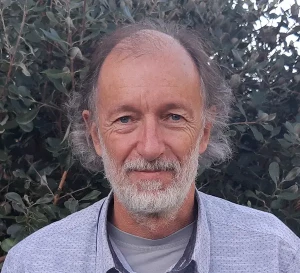 The former school science teacher graduated today with a PhD in Education and researched the experiences of 17 self-nominated, climate-conscious New Zealand teachers for his study.
The former school science teacher graduated today with a PhD in Education and researched the experiences of 17 self-nominated, climate-conscious New Zealand teachers for his study.
He says education should be at the heart of enhancing climate action in New Zealand, but that his research discovered our education system needs to liberate standardised assessment practices to empower teachers to develop relevant and impactful courses and assessments.
“Education is a lever for bringing society towards a more sustainable way of being, but our current education system perpetuates the existing socioeconomic structures responsible for climate change without encouraging the critical thinking necessary to challenge them.” Dr Thomas Everth.
Education is the pathway to making policies that direct our society away from the climate cliff we are hanging off, he says.
“If you do not educate people about climate change and the urgent need to develop sustainable ways of living, how do you expect them to follow you or vote for the policies we need to make real change?”
He says teachers who participated in the study reported feeling like they were isolated in trying to advance the curriculum to educate students about our changing climate and a way towards a more sustainable future.
“They talked about feeling very alone at their schools in trying to enact changes to the curriculum and shift students to adopt long-term thinking about sustainability,” he says.
Thomas’ study participants reported that many other teachers weren’t interested or would leave the tearoom when they talked about climate change.
“They reported feeling like they were a lone voice or viewed as the ‘greenies’, and this was stronger in areas reliant on more intensive carbon-emitting industries like dairy farming or coal mining.”
Thomas says he decided to complete his PhD and research in climate education in New Zealand after submitting a paper to the New Zealand Association for Research in Education (NZARE) Conference in Christchurch in 2019. The conference theme was ‘Revisioning education: sustaining change, wellbeing and innovation’. His paper argued that climate change education should be a priority in New Zealand schools.
“I realised at the conference... I was the only speaker that had the word climate change in my presentation.”
He says the current NCEA assessment structure stifles innovative teaching by limiting courses developed to narrowly defined assessments, but his research showed school leadership, including principals and the leadership team, could chart a different course and make climate education a priority.
This included the development of interdisciplinary learning teams and incorporating real-world problems into the curriculum.
He had done this while teaching at Mercury Bay Area School, a composite school in the Coromandel Peninsula’s Whitianga, implementing a course that combined Earth and space science with statistics for year 12 and 13 students.
“I was supported by the principal at the time to do that work which was excellent.”
Thomas is now a lecturer at EcoQuest, centre for indigeneity, ecology, and creativity in Whakatiwai, teaching undergraduate courses in ecology.
He hopes his research acts as a ‘think piece’ to be considered and discussed by school educators and leaders across New Zealand.
“If we can build capacity in school leaders and teachers through the development of knowledge and skills, and providing time and space, we will be able to see a cultural embedding of sustainable living and climate change education into the ways we all teach and learn.
“If we don’t solve climate change, then nothing else matters anymore. We can’t keep tinkering around the edges. We must stop the Titanic from sinking and then we can talk about the casino on the top deck.”



